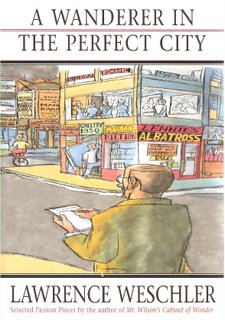 Review: A Wanderer in the Perfect City: Selected Passion Pieces, Lawrence Weschler (1998)
Review: A Wanderer in the Perfect City: Selected Passion Pieces, Lawrence Weschler (1998)A neglected abstract expressionist painter suddenly discovered by an Indian polymath, a conductor and musical lexicographer of 92 who is never happy with his achievements, a Danish cheese manufacturer who converts an abandoned country house into one of Europe's finest art galleries, a rocket scientist and stock analyst who aspires to be a clown. If there's a thread running through these pieces it must be that we, as a species, are adaptable.
Weschler, a New Yorker feature-writer, is something of a wonder himself. He seems to bring out the best in his subjects, to make them reveal their essential humanity. His medium of literary journalism, or creative non-fiction, is ideal. It enables him to explain in mimic detail the contours of each life that is being opened up to him.
And the tone that emerges in his pieces is wonderful. I was almost going to say 'unforgettable', but that would be precipitate. We will see just how unforgettable they are, in the coming year. Nevertheless, there's a level of quality in these pieces that transports you to other realms of feeling.
Weschler is an urbane and open-minded liberal. How he comes across these stories is one of the abiding secrets of the book. It seems to have something to do with the fact that the more he publishes, the more he becomes known for this type of thing, and people just bring stories to him. It's kind of like those news stories with human interest on the TV some nights. How do they happen to find, for example, just the right type of working mother who is paying $95 a day for child care? Does someone in the studio make an introduction? Surely they don't have time to advertise. The news is breaking, current.
The stories in this book are not breaking news, but they are current in a profound sense. Frequently having to do with art and artists, they seem to point to an essential need in people to be creative. In this sense, the method he uses is ideally suited to the content. Using literary techniques to tell deeply moving stories.
Not only is he liberal in his thinking, but Weschler also writes an urbane and smooth sentence. His timing is perfect. But achieving this pitch, this sense of ease, is an indication of the artistry involved in the telling.
This will not be the last of his works I will read. I found him by reading The New New Journalism, which I bought in August and reviewed in September. In fact, I've been buying and mooching titles gleaned from that work consistently over the past few months. The reward for my acquisitive patience has so far been unmitigated pleasure.
No comments:
Post a Comment